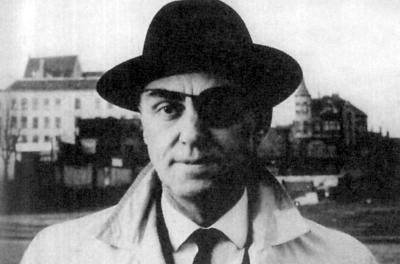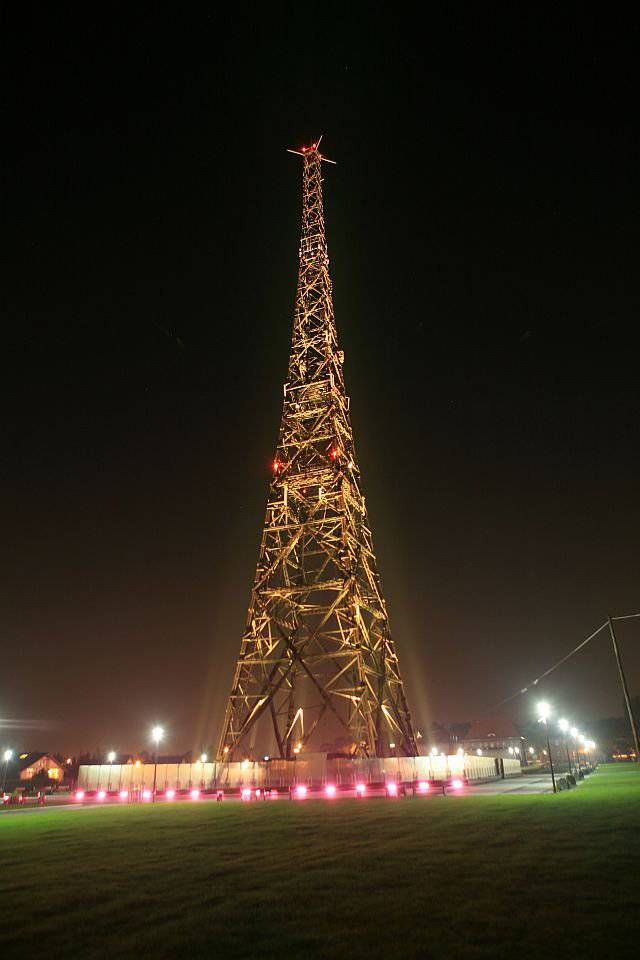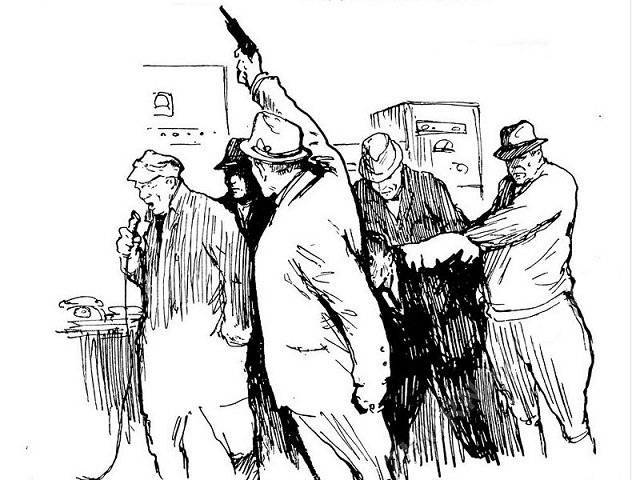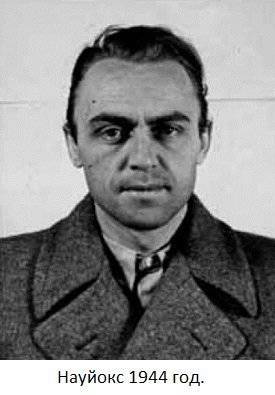The man who started World War II

Why do tourists go to Gliwice?
The town of Gliwice is located in the south of Poland in the Silesian Voivodeship. The population is slightly more than 200 thousand. By European standards - the average size of the city. The pride of the city and its landmark is the tower-height 111 meters, the tallest wooden structure in the world, which is part of the local radio museum. Every year thousands of tourists come to the city. They silently walk through the territory of a local radio station, turned into a museum. The terrible cataclysms of the 20th century spared the city. The tower and the buildings adjacent to it have been preserved intact since their construction in the 1935 year. But not story The development of radio attracts people here. It was here, in Gliwice (in 1939, the city was called Gleywitz) that World War II began, and it was here that her first shots were fired.

Casus belli for Poland
In 1939, Europe smelled of gunpowder. While the diplomats were competing in the "art of the possible", the Weiss plan was developed at the German headquarters of the high command, providing for an attack on Poland. In the late summer of 1939, in the second half of August, the Wehrmacht began to secretly carry out mobilization. The case was for small, needed a reason for war, the so-called. casus belli. This was the occasion of the provocation carried out by the SD, which went down in history as the “Gleuvice Incident”, carried out under the direct supervision of Alfred Naujoks.
The right hand of the head of the RSHA
Alfred Naujoks was born in 1911 year and because of his childhood he did not have time to fight on the fronts of the First World War. Probably, he would be a good soldier, because he possessed all the necessary qualities for this: he was brave, prone to adventures, he loved sports (he was engaged in amateur boxing). Looking for a place in post-war Germany, Naujoks entered the University of Kiel in the Faculty of Mechanical Engineering. But his wild nature was looking for another.
At the end of the 20s, Naujoks became friends with the Nazis, imbued with their ideas. His aggressiveness now found an outlet in numerous street fights that the Nazis staged with their political opponents. He became a real scourge of the left. In these first "battles" Naujoks received his first wounds, gunshot and knife wounds, the traces of which he proudly bore for the rest of his life.
In 1931, a desperate warrior was presented to Heydrich, the chief of the SS-created security service - SD. The acquaintance grew into a friendship. On the advice of a senior comrade, Alfred joined the SS. Soon Heydrich made Naujox his confidant, his right hand.

Operation "Himmler"
In the spring of 1939, the operation began to discredit Poland. The German press published articles about the oppression of Polish Germans. In their speeches, politicians constantly called for help to compatriots oppressed in Poland. With tears in their eyes, émigrés from Poland spoke about the “vileness” perpetrated by the Poles against the Germans. The guys from the ministry of Goebbels busily filmed these revelations on film, and then these film shots were shown in all cinemas of the Reich.
Remark. Justice should be noted that not everything was a lie, not all “revelations” were staged. Discriminatory actions against the Germans in Poland were, indeed, quite serious, as Hitler's propaganda skillfully used..
The apotheosis of the campaign was to be the attacks of Polish nationalists on German settlements. Operation “Himmler” envisaged the imitation of such attacks by 3: at the forestry in Bychyn, at the customs point in Khokhlinden and at the radio station in Glewitz. The latter was given a central place in the operation.
“Grandma fell ill”
Two weeks before D-Day, Naujoks and seven of his henchmen arrived at Gleywitz and settled in a local hotel. 25 August came the telegram: "Grandma fell ill." Militants began to dress in Polish clothes, laying out the pockets of Polish money and small household items made in Poland. Waited only for the team to start the operation. But instead of the telegram “Grandmother died”, the call came from Muller: “The trip is postponed”. The attack on Poland was canceled by Hitler at the very last moment. Not everyone could call Müller. One group leaked across the border and "completed the task": from the Polish side fired upon the German customs post. Himmler gave his subordinates the dressing.
"Grandma passed away"
"Grandma died" on the evening of August 31. Eight people one by one left the hotel and sat down in cars. Without a few minutes, 8 cars drove up to the station building, the Naujoks team rushed inside. The employees in the studio, seeing the guns aimed at them, raised their hands. The translator read into the microphone a text calling for all Poles to rally against the hated Germany, to start a fight and destroy every German who had the slightest resistance. Naujoks created a suitable sound design, firing several times while reading the proclamation at the ceiling. After completing the task, the group retired. On the threshold of the radio station was a corpse. According to the plan of operation, Müller was supposed to provide each incident with a suitable number of “shot by Polish gangsters” (in the documents they were held as “canned goods”). The Silesian Pole Frantisek Honek, the first victim of the Second World War, was "shot" in Gleywitz.

That same night, Naujoks and his team left for Berlin. To meet them endless stream were military units.
The next morning, all world newspapers wrote about the Glejvitz incident. At 10 in the morning hours, Hitler made a speech in the Reichstag, accusing Poland of attacking a German city, and called on the German people not to silently take down this shame. While the Führer soared on the podium, bombs were already falling on Polish cities.
Unusual assignment for “group VI-F”
In 1939, a technical department appeared in the structure of the BD - “Group VI-F”, and Naujoks, who had once studied technical disciplines, was appointed its leader. The department was engaged in the manufacture of fake passports, identity cards and all sorts of passes for employees of the SD, working outside the Reich. One day, Heydrich summoned his protege and shared his brilliant idea with him: to create a high-class brothel in Berlin for senior government officials, foreign diplomats and journalists. The best cuisine, excellent drinks, exquisite furnishings and first-class "staff". Naujoks wondered what he and his department had to do with the brothel being created? Heydrich explained: the “salon” should become a source of information, and the head of the “group VI-F” is entrusted with the task of technical implementation of this idea.
"Kitty Salon"
On a quiet street Kurfürstendamm was found a suitable building, where they spent the overhaul and reconstruction. 48 microphones were installed in the double walls, and recording equipment was installed in the basement of the house, and the staff of the SD were on duty around the clock. In the bedrooms and boudoirs put hidden photographic equipment. The head of the criminal police (V Department of the RSHA), the SS gruppenführer Arthur Nebe, recruited “highly professional employees” to the staff. By the name of the bandershi, the institution became known as the "Kitty salon". Salon quickly became popular. Diplomats, consuls and attaches, employees of foreign embassies and the German Foreign Ministry, officials of the highest rank became his regulars.
Naujoks Insurance
I did not consider it shameful for me to relax in the Kitty salon and his godfather Reinhard Heydrich. Before giving vent to his feelings, he turned off all the equipment in the room. Unlike other guests, he knew where it was located and how it was rendered inoperable. But the disconnected equipment could be turned on from the basement, directly from the recording studio. Heydrich did not know that. Naujoks did not consider it necessary to bring to his superior this small technical detail that gave the work of the leader of the “group VI-F” a flavor of piquancy.
The first listened recordings deprived Naujoks of sleep. The relaxed Heydrich boasted how he disposes of unwanted or dangerous employees. Alfred realized that neither a close relationship with the chief, nor participation in secret operations are not a guarantee of security. On the contrary, the possession of certain knowledge can be deadly for their carrier. Naujoks decided to protect himself and began to collect dirt on his boss and benefactor.
How "burned" Naujoks
At the end of 1940, in the occupied Holland, the Gestapo arrested a certain Tucker who was buying up gold. The Third Reich, leading the war for the vital space that the German people needed, was in dire need of gold reserves, and all kind of currency speculation was classified as a grave crime. During a search in Tucker's apartment, gold was found in an amount sufficient to initiate a criminal case. Tucker, in front of whom the very real prospect of changing an apartment in Berlin to a hut in a concentration camp, loomed, at the first interrogation, named a person in whose interests he bought precious metals: Alfred Naujoks. After a little hesitation, Müller went all in and gave the order to conduct a search in the Berlin apartment of a close friend of the head of the RSHA, and as it turned out, he did not lose. The Gestapo men did not find gold, but something more valuable was found, which the Gestapo chief did not count on.
The next morning, Muller had a conversation with Heydrich. He wondered on what grounds the Gestapo searches in the apartments of the employees of the SD. Having sustained the first blow, Muller laid out to Heydrich the trump ace - the tapes of his drunken revelations made by Naujoks in the Kitty Salon. The mood at the head of the RSHA abruptly deteriorated.
From the Sturmbannführer to the privates and to the front
For committing acts incompatible with the honor of an SS officer, the Sturmbannführer Naujoks was demoted to the ranks and dismissed from the SD. A member of the “old guard”, a member of many secret operations (attack and defeat of the Spanish embassy in Berlin in 1936, Gleuvice incident, “Venlo” operation, “Bernhard” operation, “Kitty salon”), one of the first to receive I class Iron Cross , Alfred Naujoks was sent to the SS division "Leibstandart Adolf Hitler" to atone for his fault on the battlefield. To the division commander, General Sepp, Dietrich Heydrich wrote a letter in which he characterized Private Nauyox as a brave soldier, well suited for performing particularly important missions associated with mortal risk. (Read between the lines: ditch, and as soon as possible.) Alfred Naujoks was not destined to go down in history as a specialist in secret operations No. XXUMX. He left the stage. In 1, the vacant place was taken by Otto Skorzeny from Vienna.
Sunset
Spas Naujoks ... Hitler, shortly before the order, according to which no carrier of the highest secrets of the Reich (and Naujoks undoubtedly was such) should not take part in operations associated with the risk of being captured. After the death of Heydrich (who all hoped that his protege would lay down his head for the Fuhrer and the Reich on the Eastern Front) Naujoks was transferred to Belgium. Registered in the state of the occupying economic service, he was looking for members of the Resistance in Belgium, Denmark and Holland. In October, 1944, the quick-witted Naujoks, ran over to the Americans and began to fight against the regime that suddenly became hated by him. At the Nuremberg Trials, Naujoks spoke as a witness and spoke in detail about his participation in the Gleywick provocations, which resulted in one less mystery for the Third Reich.

Subsequently, the small merchant Naujoks lived in Hamburg, published his memoirs. Died in 60's. According to the memories of neighbors, he did not suffer from remorse of conscience.
Sources:
http://russlov.com/entsiklopediya_tretego_reyha/page/nauyoks_alfred_helmut.571/
http://www.protown.ru/information/hide/7042.html
http://www.hrono.ru/biograf/bio_n/nauyoks.html
http://www.peoples.ru/military/scout/alfred_naujocks/
http://ru.wikipedia.org
http://www.ua-reporter.com/novosti/62685
http://alternathistory.org.ua
http://www.radioporusski.pl
Information